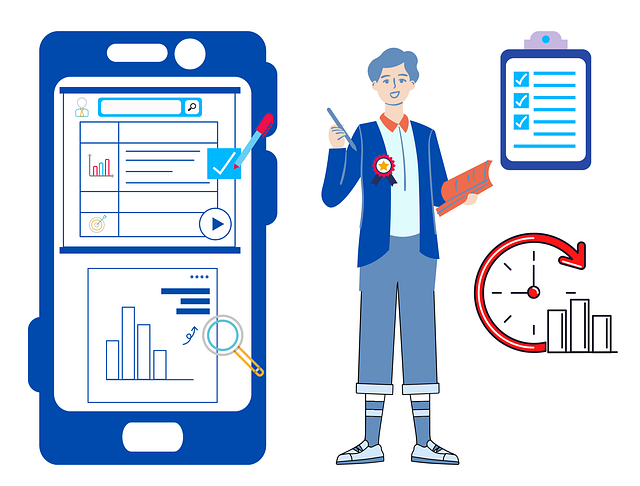Integrating AI business automation in repair shops offers a competitive edge by streamlining operations, enhancing customer experiences, and improving efficiency. This involves automating tasks like scheduling and data management, using AI chatbots for initial inquiries, and leveraging analytics for targeted marketing campaigns. By following strategic steps including identifying repetitive tasks, selecting suitable tools, preparing data, training models, and optimizing performance based on feedback, repair shops can leverage AI to stay competitive in the digital age, tailor services to specific vehicle needs, and drive business growth while ensuring customer satisfaction.
In today’s digital age, car repair shops can leverage AI marketing strategies to enhance customer engagement, streamline operations, and boost profits. This article explores the transformative potential of Artificial Intelligence (AI) in the automotive industry, with a specific focus on AI business automation for repair shops. We’ll guide you through understanding, implementing, and maximizing the benefits of AI marketing, offering a step-by-step approach to stay ahead in a competitive market.
- Understanding AI Integration for Car Repair Shops
- Implementing AI Business Automation: Step-by-Step Guide
- Benefits and Best Practices for AI Marketing in the Automotive Industry
Understanding AI Integration for Car Repair Shops

In today’s digital era, car repair shops can greatly benefit from integrating AI (artificial intelligence) into their marketing strategies and business operations. AI business automation for repair shops offers a range of advantages that can streamline processes, enhance customer engagement, and ultimately drive growth. By leveraging machine learning algorithms and natural language processing, these shops can automate tasks such as scheduling appointments, providing personalized recommendations for vehicle maintenance, and even offering predictive diagnostics based on vehicle data.
This integration enables car repair shops to offer a more efficient and customer-centric experience. AI chatbots can handle initial inquiries, provide quick estimates, and guide customers through the repair process, saving time and resources. Moreover, AI analytics can reveal valuable insights into customer behavior, allowing shops to tailor marketing campaigns and services to specific vehicle models or common issues, ensuring that their efforts are targeted and effective.
Implementing AI Business Automation: Step-by-Step Guide

Implementing AI Business Automation: Step-by-Step Guide
1. Identify Key Areas: Begin by pinpointing the most time-consuming and repetitive tasks in your car repair shop’s operations, such as scheduling appointments, managing customer data, or sending reminders. These are prime candidates for automation.
2. Choose the Right AI Tools: Explore AI solutions designed specifically for repair shops, focusing on features like automated appointment booking, natural language processing chatbots for customer support, and predictive analytics to forecast maintenance needs. Ensure these tools integrate seamlessly with your existing systems.
3. Data Preparation: AI relies on quality data. Organize and clean your customer records, service histories, and vehicle details to train AI models accurately. Standardize data formats and ensure all necessary fields are complete.
4. Train and Implement: Feed relevant data into your chosen AI tools, training them to recognize patterns and make predictions. Test the system rigorously before rolling it out. Once implemented, monitor its performance closely and adjust parameters as needed.
5. Optimize and Iterate: Continuously analyze the impact of AI automation on your shop’s efficiency and customer satisfaction. Gather feedback from staff and clients to refine processes and introduce new AI capabilities over time.
Benefits and Best Practices for AI Marketing in the Automotive Industry

The integration of AI marketing strategies offers car repair shops a competitive edge in an increasingly digital landscape. By leveraging AI, these businesses can streamline their marketing efforts and enhance customer engagement. One of the key benefits is personalized communication; AI algorithms can analyze customer data to tailor marketing messages, ensuring that each client receives relevant information about services they are likely to need. This level of customization improves customer satisfaction and loyalty.
Best practices for implementing AI in automotive marketing include utilizing natural language processing (NLP) for chatbot interactions, enabling 24/7 customer support and quick service inquiries. Additionally, predictive analytics can anticipate maintenance needs based on vehicle data, allowing shops to proactively reach out to customers. AI business automation also facilitates efficient lead management, prioritizing prospects based on their likelihood of conversion, which ultimately optimizes marketing ROI.
Integrating AI into car repair shop marketing strategies is not just a trend but a necessary step towards modernizing the automotive industry. By implementing AI business automation, these shops can streamline processes, enhance customer experiences, and gain valuable insights. From predictive maintenance to personalized marketing campaigns, AI offers a competitive edge. Following the steps outlined in this guide, repair shops can efficiently adopt AI, improving their overall efficiency and attracting a tech-savvy clientele. Embracing AI marketing is key to staying relevant and thriving in the digital age of car care.
